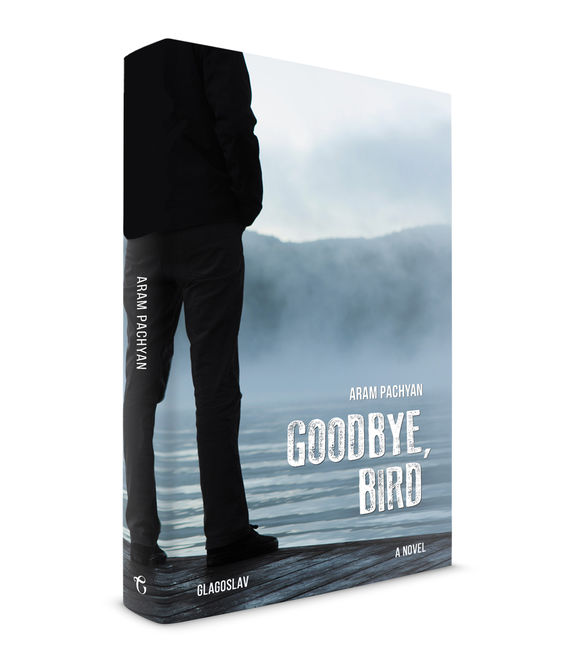
Pachyan started his writing career in his mid-twenties. Right from the time his first short stories were published in local literary newspapers and magazines, it was obvious that an outstanding talent had emerged. His first book, Robinzon, a collection of short stories, was very well accepted by both readers and literary circles. But when his novel, Goodbye, Bird was published in 2012, Pachyan became the most discussed and controversial author of his time, heralding a new age in contemporary Armenian literature.
“No, this is not a book about the army,” the author had to explain many times… The army is a taboo topic in Armenia and you can’t be too critical about it when you live in a country stuck in a long-lasting or rather never-ending war with your neighbour. But well, again, this is not a book about the army, it is simply a metaphor for a repressed society, a closed community.
Pachyan’s language and style are exquisite, tending to balance literary “correct” Armenian and modern slang, and reflecting the current realities. But what makes the novel a potential success is that it touches upon the inner world of individuals in their confrontation against their communities. This kind of struggle is typical to all humans and is not limited to ethnic or religious groups. We are all, in one way or another, fighting to stay loyal to ourselves.
After I read the manuscript of Goodbye, Bird, it didn’t let me go for many months. I kept living with the characters, and caught myself trying to solve my own inner struggles through their personalities. Not long after, I could see myself representing this complicated and puzzling book to the world. But once the decision was taken, the implementation of the plan turned out to be a daunting challenge.
Now, let me tell you what is so special about Goodbye, Bird and what it means to promote Aram Pachyan’s work.
Initially, it took me a long time to figure out how to talk about this book. “I fell in love with it from the moment I started to read it.” No, not true! It is not the beginning of the book that hooks you, it’s the end, actually it’s the cumulative effect of it. So my ultimate goal was to convince an editor to read Pachyan’s book till the end.
I am not naïve, I know that editors rarely read submissions till the end, unless they get hooked right from the beginning. But with Bird, as I call it, you will not grasp the whole picture until you actually finish the book and even then, you may need to sleep on it for days.
We all know that the world is not black or white, neither are humans just good or evil. The author masterfully makes you love and hate all these fictitious characters who become so realistic, you believe that you must have met them somewhere sometime. You feel how emotions overwhelm you, when you fight the urge to throw the book into the fireplace, if there is one nearby, or tear it up into 250 pages and send them flying out the window. But some unexplainable force makes you keep reading because you know there should be more to it. There, in the next chapter, you will meet yourself or a friend of yours or someone you were once told about and could never forget. You HAVE to read it to make sure all you suspected about life and death, good and evil, beauty and ugliness were all bullshit. Because this world, in this book, feels more like a reality, than the one you have lived your whole life.
I am a diplomat, and the books are ambassadors, they are extraordinary and plenipotentiary representatives of Armenia and Armenians, and they need to talk in the languages of the world to be heard ultimately.
The reading of Goodbye, Bird is a struggle, a struggle with the text, words and notions. It is a struggle with the unbearable emotions of the characters, it is a prediction of the next eye-opening reality of life, which you knew but never wanted to admit.
“I reread the book when it was published. Oh, my God, not even one sober word in it,” admitted the author when we were driving to a discussion of the novel with readers, sometime after its presentation. Then he added, “But there isn’t a single word that isn’t in its place and purposeful, at least for myself.”
It would not have been possible to come across a literary work such as this two decades ago. State funded publishing in the Soviet era was strictly censored and limited to either historical themes or propaganda. Over the past 20 years, a whole generation of authors have been struggling to find their new language of expression and ways to address contemporary problems through literature. And this struggle is not yet over. What Aram Pachyan and his generation are trying to do now, is to establish new rules and create new values out of the freedom they were given or rather the freedom they fought to achieve.
As a literary agent, my fight is different from those of the writers. I am a diplomat, and the books are ambassadors, they are extraordinary and plenipotentiary representatives of Armenia and Armenians, and they need to talk in the languages of the world to be heard ultimately. So, when Goodbye, Bird was finally published by Glagoslav Publications, UK, translated by Nairi Hakhverdi, another warrior promoting Armenian literature, I felt the first breath of relief and the immediate urge to go further. French, Bulgarian and Georgian translations are next steps and more is yet to come. So Hello, Bird, it is too soon for Goodbyes…


